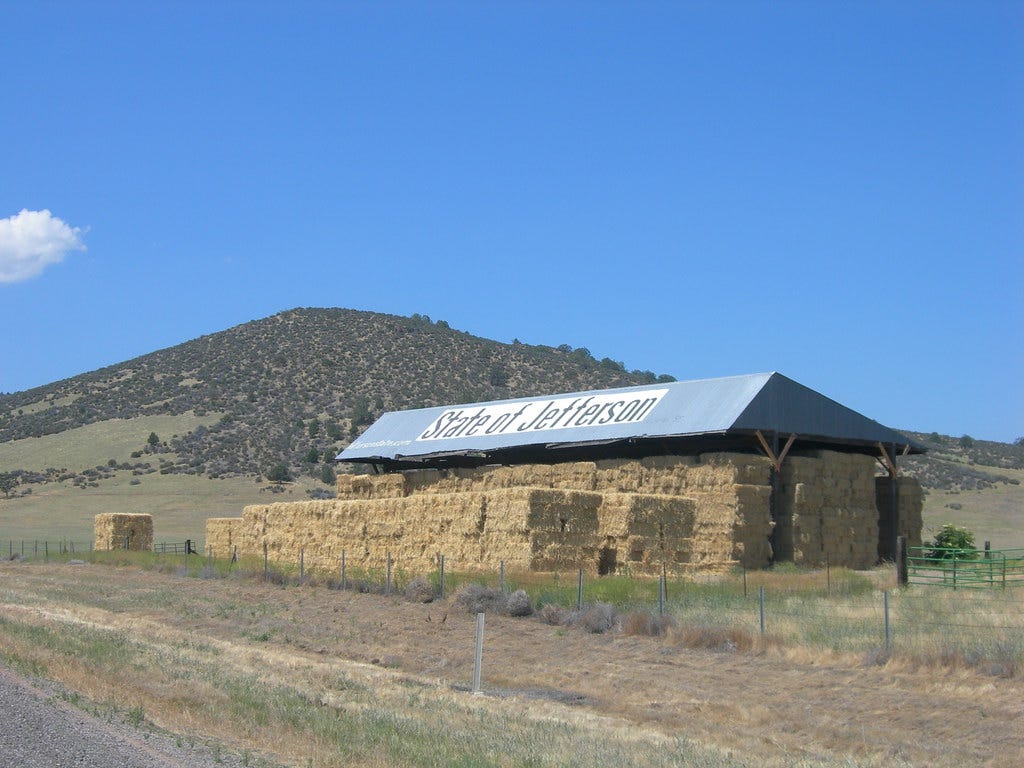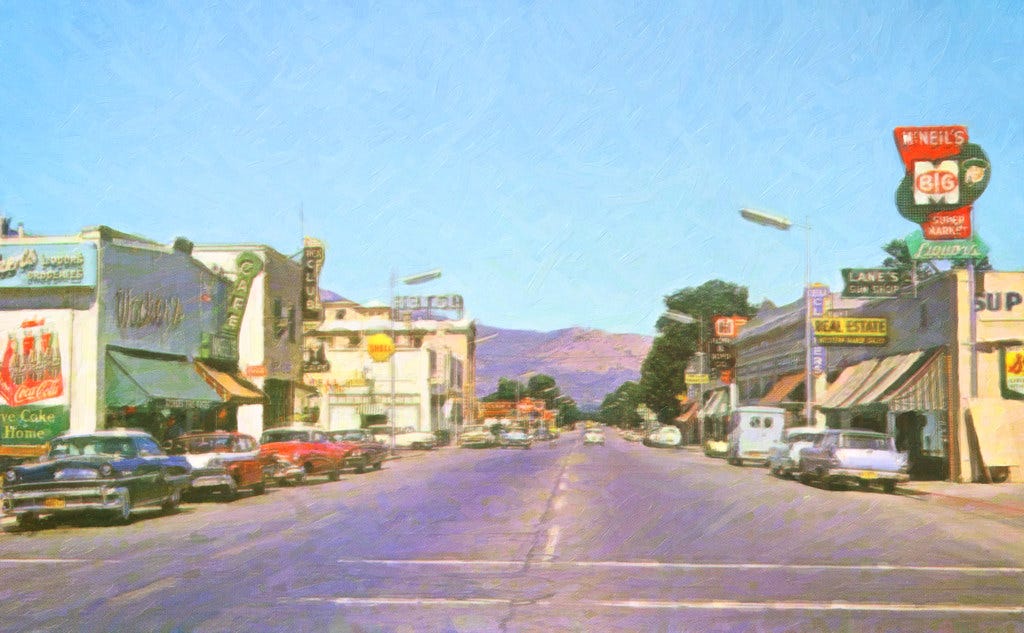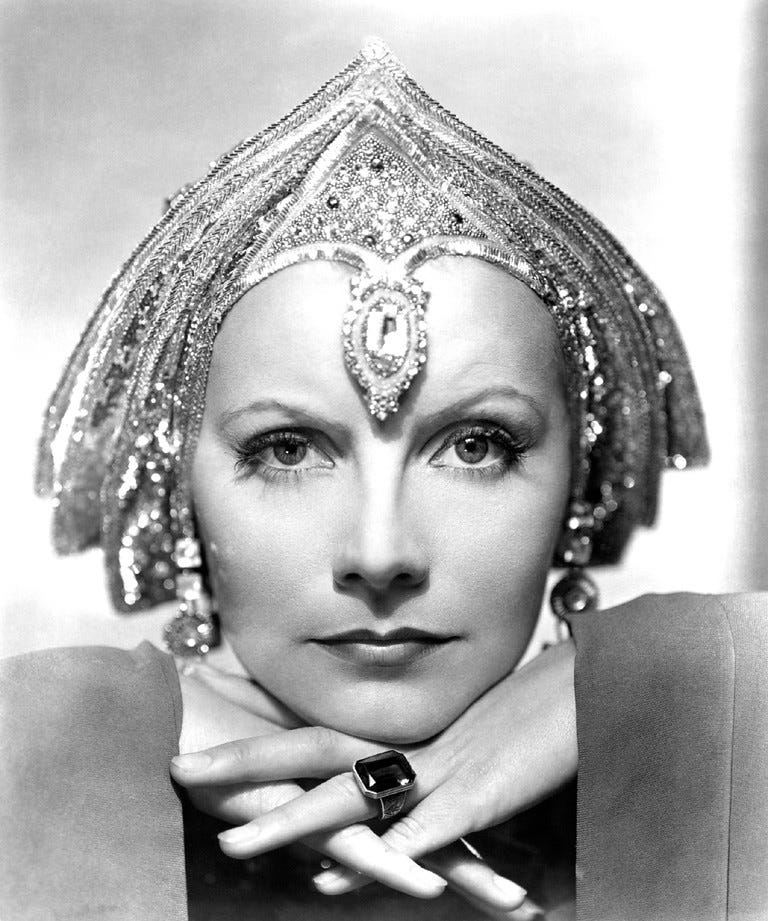Peter Laufer: The Great State of Garbo
For a place where history – in fact and fancy – was created by the deft use of publicity, the name change to Garbo would almost certainly put bland Jefferson back in headlines around the world.
Peter Laufer is the University of Oregon James Wallace Chair Professor in Journalism and author of The Elusive State of Jefferson: A Journey through the 51st State.
The Great State of Garbo

"State of Jefferson Hay Barn" by jimmywayne is licensed under CC BY-NC-ND 2.0
Malcontents in deep southern Oregon and far northern California have been gnawing on the fantasy of secession from Salem and Sacramento since 1854. The proposed new state’s borders wander from the southern reaches of Roseburg to Mendocino – or more, depending on who is drawing the map and when.
Many of the secessionists fancy themselves as rugged individualists, survivalists and back-to-the-landers, and they see urbanite-driven government from the current state capitals as an unnecessary intrusion on their rights to fend for themselves. Others are strict regionalists who see irreconcilable differences between their sparsely populated wild lands and the metropolises that govern them.
The dream of secession is rekindled of late by the vast region’s lagging economy and the misconception that back in 1941 – were it not for the attack on Pearl Harbor – Port Orford (or Yreka) now would be the thriving capital of the elusive State of Jefferson. “We were so close!” some Jeffersonians seem to believe.
Reasonable and understandable grievances plague Jefferson. The Great Recession came as the area’s logging, fishing and mining industries were already staggered by exploitation and regulation. Unemployment and underemployment continue endemic.
I spent a year wandering Jefferson’s back roads listening to its citizens’ complaints, ideas and hopes. I wanted to understand the local grievances and learn what perpetuates the passion to continue the Sisyphean task of trying to carve a new state out of two with histories dating back to the mid-1800s.
Sparsely populated Jefferson at least knows how to make itself feel better when times are tough: gin up the statehood charade. Jeffersonians historically find it easy to pretend that, without the rest of us meddling in their affairs, their problems could be solved among themselves. The State of Jefferson publicity machine was honed by Port Orford mayor Gilbert Gable, a public relations practitioner from back East and the San Francisco Chronicle reporter Stanton Delaplane, who won a Pulitzer Prize for his 1941 State of Jefferson reporting. Mayor Gable generated national attention when he threatened secession while seeking state funds to build roads to exploit Jefferson’s natural resources in a more efficient manner. Journalist Delaplane's front-page dispatches from the seceding “state” were fancy-filled with imaginative prose, a welcome relief for readers weary of war talk.
“We compared notes and decided how we would do it,” Delaplane explained of their alcohol-fueled meeting. “The only thing the matter with it was Mayor Gable died the next day of a heart attack.” The newsman soberly noted the value of the sudden death to his story. “It made for a very dramatic ending to a seven-day series, and I think that is what impressed the Pulitzer Prize committee.”
The legend of the 1941 Jefferson movement is fueled by the Delaplane-authored Jefferson Proclamation of Independence and on the Highway 99 roadblocks, immortalized with black-and-white photographs of rifle-toting Jeffersonians stopping northbound motorists and foisting propaganda on the unsuspecting travelers:
You are now entering Jefferson the 49th State of the Union.
Jefferson is now in patriotic rebellion against the States of California and Oregon.
This State has seceded from California and Oregon this Thursday, November 27, 1941.
Patriotic Jeffersonians intend to secede each Thursday until further notice.
The 1941 ad hoc State of Jefferson Citizens Committee decided to stage a secession parade through downtown Yreka with a rousing speech by “Governor” Childs at a rally in front of the courthouse. Or perhaps the television crews sent to Jefferson from Hollywood directed the committee to organize the march and rally because their cameras needed the “news.”

"Yreka, California" by Thomas Hawk is licensed under CC BY-NC 2.0
Those 1941 theatrics in Yreka led directly to the periodic and continuing efforts to create some sort of State of Jefferson – promoted by entrepreneurs and regionalists, along with politicians both amateur and professional.
The lasting appeal of the Jefferson statehood tale is one that mirrors a fundamental Western fantasy that we’re rugged individualists who like to go it alone.
Rick Jones, owner of the general store in Seiad Valley just south of the Oregon border, understands the lure of a Jefferson. “All our tax money goes south to Sacramento and nothing comes back here,” he complains even as his cash register rings with sales of Jefferson caps, t-shirts and bumper stickers.
In fact, much more taxpayer money goes back to Jefferson for roads and social services than Jones and his neighbors send to south to Sacto or north to Salem.
Another problem for Jefferson is the name and its origin. Given the horrific racist history of Oregon, did the Founding Fathers (and they were almost exclusively men) of Jefferson pick the name to honor the Confederate president or the slave-owning author of the Declaration of Independence? Regardless, the name Jefferson is, I suggest, not only freighted with racism but rather banal.

"Greta Garbo" by twm1340 is licensed under CC BY-SA 2.0
How about adding a dash of the golden age of Hollywood – a symbol like, for example, Greta Garbo? Garbo is a much more appropriate moniker for the break-away state. Once retired from acting, Garbo became famous for wanting to be left alone. Aggrieved Jeffersonians also say they want to be left alone. Garbo as a state name would be enigmatic and private with a wry nod to celebrity. Imagine: Ashland, Garbo! Yreka, Garbo! Roseburg, Garbo!
For a place where history – in fact and fancy – was created by the deft use of publicity, the name change to Garbo would almost certainly put bland Jefferson back in headlines around the world, if only for a day.
******************************
Keep the conversation going: Facebook (facebook.com/oregonway), Twitter (@the_oregon_way)



